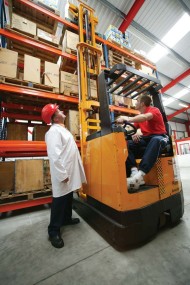 Tony was a good lad. He’d been in his new job a couple of months when his boss told him to bring the fork lift across the yard. Tony hesitated. Sure, he knew how to drive a car… but he’d never even sat on a fork truck and he certainly hadn’t been trained. How difficult could it be? Seating himself, he worked out how to lift the forks and, with only a slight jolt, drove it into place. Relieved, and a bit elated, he climbed off and went about his normal work.
Tony was a good lad. He’d been in his new job a couple of months when his boss told him to bring the fork lift across the yard. Tony hesitated. Sure, he knew how to drive a car… but he’d never even sat on a fork truck and he certainly hadn’t been trained. How difficult could it be? Seating himself, he worked out how to lift the forks and, with only a slight jolt, drove it into place. Relieved, and a bit elated, he climbed off and went about his normal work.
Two days later he was told to drive the fork lift again. Only this time it was already carrying a load – a massive sheet of plate glass worth thousands. Gripped by the spectre of what could go wrong… smashed glass everywhere… his boss going ballistic… someone fatally injured – him perhaps – Tony was rooted to the spot. “Come on Doris!” his boss jeered as co-workers gathered to see what would happen next.
Tony’s dilemma: do as you’re told… or stand your ground – and say you haven’t been trained yet.
This is a true story. One that is being repeated many times a day throughout the UK…leading to serious accidents, injuries and costly damage.
As an employer, it is your duty to provide appropriate training and to regularly assess individual skill levels. Yet the latest statistics indicate that more than half of the men and women who regularly work with or near fork lift trucks in Britain are not sufficiently trained. By not prioritising training, some companies are knowingly placing their workers and businesses at risk.
While the FLTA’s Safety Week campaign has resulted in a decline in fork lift truck accidents in Britain’s workplaces, one UK worker is still hospitalised every day by a fork lift truck. That is still one too many. Worse still – in the vast majority of cases, the accident could have been avoided with suitable training.
For many employers it is clear that operators need to be properly trained. However, other employees working near fork lift trucks are also at risk. They also need training – to make them aware of the real dangers posed by fork lift trucks and to keep themselves safe.
The UK’s most comprehensive fork lift truck safety event
The crucial issue of fork lift training will be covered from a variety of perspectives at this year’s National Fork Lift Truck Safety Conference, held at Warwick University on Wednesday 21st September.
As an introduction to the Conference, the Health & Safety Executive will bring delegates up to date with the training scene. Representatives will discuss the recent HSE review of fork lift truck training, including the content of L117 and HSG6 and the underlying training policies. In a discussion of the investigation’s findings, they will reveal how fork lift truck operator training – including the role of Accrediting Bodies – may develop in the years ahead.
In his session, Peter Lennon from the HSE will explain the system of Accrediting Bodies and indicate what each organisation has to offer. Perhaps for the first time ever, the Conference will bring together senior representatives from each of the six Accrediting Bodies.
Delegates will have the unique opportunity to put their questions about the accreditation system and training generally to this expert panel. Where appropriate the HSE will be invited to comment, too.
And there’s more…
• Comprehensive results of the FLTA’s landmark ‘Silent Danger’ research
• Alcohol and drug risks in the workplace
• Statutory inspection requirements for mobile and fixed LPG installations
• The FLTA’s Pick of the Year’s best safety products for 2011
Be there!
The National Fork Lift Truck Safety Conference, sponsored by Calor Gas, will be held in the Ramphal Building at Warwick University on Wednesday 21st September 2011. The one-day event will run from 9:45am until 5:00pm.
Tickets for the one-day event are priced at £107 (plus VAT). FLTA Members are entitled to a special discounted rate of just £80 (plus VAT) per person.
Full details on the event – including how to book online – are available from: www.fork-truck.org.uk/safety-conference.
PS: In case you are wondering, Tony didn’t drive the truck… nor did he stay at the company. He’s now working for a more enlightened employer, who is already planning to provide him with fork truck training – “just in case”.




Comments are closed.